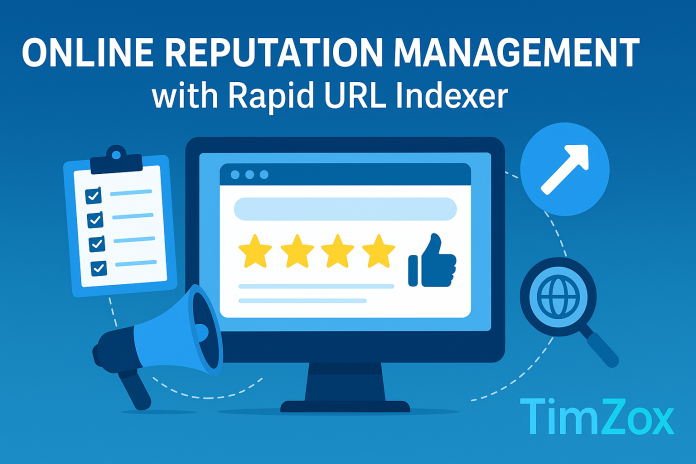In the digital-first world of 2025, your online reputation can be your most powerful asset—or your greatest liability. One viral review or news story can shape public perception within hours. This is why Online Reputation Management (ORM) is not just a PR function but a business-critical priority.
The challenge? Even the best content is useless if it doesn’t get indexed by search engines fast enough to mitigate or override negative publicity. This is where Rapid URL Indexer, a tool designed to expedite the crawling and indexing of URLs, becomes essential. In this guide, we’ll explore how Rapid URL Indexer enhances your ORM strategy and how to deploy it effectively.
Understanding Online Reputation Management (ORM)
ORM involves monitoring and influencing how your brand is perceived across digital platforms—search engines, review sites, social media, and online news.
Key Components of ORM:
-
Search Engine Results Page (SERP) Management
-
Review Monitoring
-
Brand Mentions Tracking
-
Content Strategy and Syndication
-
Crisis Response Planning
According to a 2023 survey by Edelman Trust Barometer, 74% of consumers said they trust a company more if they find consistent, positive online information about it.
The Impact of Search Visibility on Brand Reputation
Why Search Rankings Matter
Google is often the first place people go to learn about a brand. If negative content ranks highly, it can harm trust, sales, and even investor confidence.
Key Data:
-
93% of online experiences begin with a search engine (BrightEdge)
-
68% of users don’t go past the first page of Google (Moz)
That means indexing positive content quickly isn’t just a nice-to-have—it’s mission-critical.
What Is Rapid URL Indexer?
Rapid URL Indexer is a specialized tool that automates the process of submitting URLs to search engines like Google, Bing, and Yahoo. Unlike passive waiting for bots to discover your page, this tool proactively notifies search engines of new or updated content, improving indexing speed dramatically.
Features:
-
Bulk URL submission
-
Integration with APIs (Google Indexing API)
-
Status tracking
-
Scheduled indexing tasks
“Speed to index is becoming just as important as speed to publish.” — Barry Schwartz, Search Engine Roundtable
Why Speed Matters in ORM
The Problem
When negative content surfaces—such as a bad review, lawsuit, or scandal—brands often rush to publish positive counter-narratives. But without fast indexing, those new articles or landing pages may take days or weeks to appear in SERPs.
The Solution: Rapid Indexing
Using tools like Rapid URL Indexer enables ORM professionals to:
-
Push new positive content to Google’s index within hours
-
Suppress harmful links by improving SERP diversity
-
Strengthen domain authority via rapid backlink indexing
How to Integrate Rapid URL Indexer into Your ORM Strategy
Step-by-Step Deployment
1. Audit Your Online Presence
Use tools like SEMrush, Ahrefs, or Brandwatch to identify negative or outdated search results.
2. Publish High-Authority Content
Create:
-
Expert interviews
-
Press releases
-
Case studies
-
Client testimonials
3. Submit URLs via Rapid URL Indexer
Prioritize:
-
Pages on your primary domain
-
Media coverage
-
Review site profiles
4. Monitor Indexing Speed
Use Google Search Console and the Indexing API to verify when content is picked up.
5. Link Strategically
Internally and externally link new pages to already-indexed high-authority pages to boost crawl frequency.
Best Practices for ORM Success
| Practice | Why It Matters |
|---|---|
| Mobile Optimization | 65% of searches happen on mobile |
| Fast Load Speed | Directly affects bounce rate and rankings |
| Schema Markup | Helps rich results appear in SERP |
| HTTPS | Security builds trust and boosts rankings |
| Fresh Content | Google favors updated, relevant pages |
SEO Considerations:
-
Use branded and long-tail keywords (e.g., “[Brand Name] customer success story”)
-
Optimize title tags and meta descriptions
-
Use high-quality alt text for all media
-
Build dofollow backlinks to authoritative sources
Case Studies & Expert Opinions
Case Study: Healthcare Startup Rebranding
A healthtech startup faced a lawsuit, and negative articles dominated the first page of Google. By publishing a series of expert-led blogs and video interviews, then indexing them using Rapid URL Indexer, they shifted SERP real estate in under 30 days.
Results:
-
6 out of 10 top search results were positive content
-
43% increase in branded search traffic
-
60% drop in bounce rate
Expert Insight:
“Fast indexing is one of the last competitive advantages in modern SEO. ORM professionals who ignore it are playing catch-up.”
— Lily Ray, Director of SEO, Amsive Digital
Future of ORM and Indexing Tools
Trends to Watch:
-
AI-generated content moderation
-
Indexing via direct API calls
-
Enhanced user experience signals in Google ranking
-
The rise of decentralized reputation platforms (Web3)
Read Also: Everything to Know About Qullnowisfap Products
Conclusion & Actionable Takeaways
Online Reputation Management is no longer a reactive PR function—it’s a continuous SEO and content strategy. By integrating Rapid URL Indexer into your ORM toolkit, you can ensure that your best content surfaces at the right time, where it matters most: the first page of Google.
Key Takeaways:
-
Speed to index = speed to impact
-
Always monitor your branded SERPs
-
Use schema, compression, and mobile-friendly design
-
Pair quality content with indexing automation tools
-
Continuously update and adapt your content strategy


